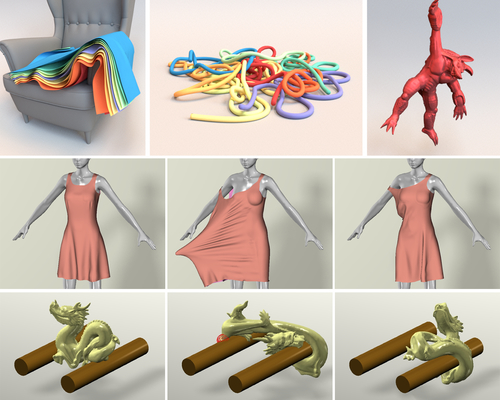-
 Full Conference Pass (FC)
Full Conference Pass (FC)
-
 Full Conference One-Day Pass (1D)
Full Conference One-Day Pass (1D)
Date: Friday, December 7th
Time: 2:15pm - 4:00pm
Venue: Hall D1 (1F, D Block)
Summary: Physics-based animation of elastic materials allows to simulate dynamic deformable objects such as fabrics, human tissue, hair, etc. Due to their complex inner mechanical behaviour, it is difficult to replicate their motions interactively and accurately at the same time. This course introduces students and practitioners to several parallel iterative techniques to tackle this problem and achieve elastic deformations in real-time. We focus on techniques for applications such as video games and interactive design, with \textit{fixed and small hard time budgets} available for physically-based animation, and where responsiveness and stability are often more important than accuracy, as long as the results are believable. The course focuses on solvers able to fully exploit the computational capabilities of modern GPU architectures, effectively solving systems of hundreds of thousands of nonlinear equations in a matter of few milliseconds. The course introduces the basic concepts concerning physics-based elastic objects, and provide an overview of the different types of numerical solvers available in the literature. Then, we show how some variants of traditional solvers can address real-time animation and assess them in terms of accuracy, robustness and performance. Practical examples are provided throughout the course, in particular how to apply the depicted solvers to Projective Dynamics and Position-based Dynamics, two recent and popular physics models for elastic materials.
Author(s)/Speaker(s):
Moderator: Marco Fratarcangeli, Chalmers University of Technology, Sweden
Lecturer(s): Marco Fratarcangeli, Chalmers University of Technology, Sweden
Yin Yang, University of New Mexico, United States of America
Huamin Wang, Ohio State University, United States of America
Author(s)/Speaker(s) Bio:
Dr. Marco Fratarcangeli is an associate professor in the department in Computer Science and
Engineering at Chalmers University of Technology, Gothenburg, Sweden. His main academic interests are in the area of real-time computer animations based on the physics of motion, or Physically based animation. He has been awarded the Young Researcher grant from Vetenskapsrådet (Swedish Research Council) in 2015.
Dr. Marco Fratarcangeli is an associate professor in the department in Computer Science and
Engineering at Chalmers University of Technology, Gothenburg, Sweden. His main academic interests are in the area of real-time computer animations based on the physics of motion, or Physically based animation. He has been awarded the Young Researcher grant from Vetenskapsrådet (Swedish Research Council) in 2015.
Dr. Yin Yang is currently an assistant professor with the department of Electrical and Computer Engineering at the University of New Mexico, Albuquerque, USA. He received Ph.D. degree of Computer Science from the University of Texas, Dallas in 2013 (awardee of David Daniel Fellowship Prize, 2013). He was a Research Intern in Microsoft Research Asia during March to June in 2012. His research mainly focuses on physics-based simulation and its applications in
computer graphics, game, animation and visualization. Dr. Yang has extensively published in areas of computer graphics, animation, computer aided design, and medical imaging.
Dr. Huamin Wang is an associate professor in the department of Computer Science and Engineering at the Ohio State University. He received his Ph.D. degree in Computer Science from Georgia Institute of Technology, the M.S. degree in Computer Science from Stanford University, and the B.Eng. degree from Zhejiang University. He is the recipient of the College of Engineering’s Lumley research award from OSU in 2017. He received NVIDIA fellowship in 2006.




